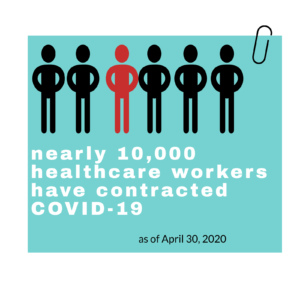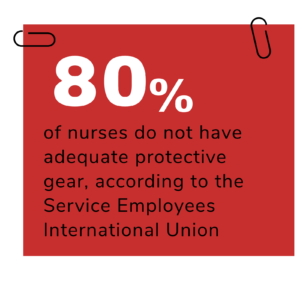Nursing advocates in a pandemic include large healthcare organizations and also professional nursing organizations. In today’s ever-changing world, nurses are struggling to protect themselves and their patients from COVID-19. Many nurses are working hard to provide patient care around the clock and have little time to advocate for themselves in a world that is quickly becoming less and less safe for healthcare professionals. Let’s take a look at what nurses are and aren’t required to do in these unprecedented times, and take a look at who is advocating for nurses and nursing assistants.
What are Nurses’ Ethical Considerations in a Pandemic?
Nurses work hard to protect their patients, but they also need to protect themselves. There is currently a shortage of personal protection equipment, or PPE, which is inhibiting nurses from properly doing their jobs. A nurse works to provide the best possible care to his or her patients. When nurses don’t have proper PPE, they’re unable to protect themselves from many pathogens, including the coronavirus. This means that a nurse is not only putting their own health at risk – they are also putting the lives of other patients at risk.

Featured Programs
The coronavirus doesn’t show up for many people until after they’ve already had the virus for up to two weeks. During this two-week incubation period, the person who is carrying the virus is contagious. While this is problematic for the population at large, it’s especially an issue for people in the healthcare field. A nurse never wants to harm their patients, but when they’re forced to work without PPE, they have no way of knowing whether they’re carrying the coronavirus. This means that they may be passing the virus from patient to patient, or even to other healthcare providers.
Many nurses are carefully weighing their options when it comes to working without proper PPE, deciding whether it’s ethical for them to continue providing patient care knowing they may be infected with the coronavirus. While many experts agree that this should be a personal choice left up to each nurse, some healthcare facilities are penalizing or even terminating nurses who refuse to work without proper PPE.
What are a Nurses’ Obligations in a Pandemic or Disaster?
Many nurses find themselves in a difficult predicament in this time of high need. According to the American Nurses Association, nurses must provide care for others – but they also must care for themselves. In a world where nurses find themselves on the front lines of a dangerous situation, nurses’ obligations in a pandemic or disaster become fuzzy. Nurses and their nursing supervisors must make careful decisions to figure out what line of action makes the most sense for them and their patients.
While many nurses make the choice to continue working even when their personal safety is at risk, the situation begs the question of whether a nurse should have to do so in order to keep her job. Many nurses are arguing that they should be able to make the choice of whether to jeopardize their personal safety, while many healthcare organizations are arguing that nurses should perform their duties to the best of their ability with the equipment the healthcare organization has available. This discrepancy in expectations is causing many people in both healthcare advocacy groups and the general public to advocate for nurses.
What are Nurses’ Safety Rights During a Pandemic?
According to the American Nurses Association, nurses must be able to decide for themselves how much patient care they’re able to provide given the supplies available and also protect themselves and their families. A nurse has the right to decide whether they can perform their job safely.
Some nurses have expressed frustration due to the fact that healthcare organizations are suddenly relaxing previously stringent rules on PPE. While healthcare organizations are doing their best to provide the rapid influx of patients with the care that they need, many people advocating for nurses and nursing assistants feel that this level of care is putting nurses at risk. Some nurses feel insulted by the advice being offered by their supervisors.
Hard Decisions for Nurses
One registered nurse practitioner who wished to remain anonymous due to possible disciplinary action stated, “I remember in March when COVID was just starting to be a concern, I was actually told by one of my nursing homes ‘NOT to wear a mask unless someone was coughing. The problem with this was patients didn’t cough until I was already in the room without a mask. About a week later I had symptoms but actually tested negative.
I really think it was a false negative though because it was one of the early tests being offered in my area, and it isn’t clear how accurate these were or what the false-negative rate still even is. I’m hoping I had it and am immune.”
Nurses are being forced to make hard decisions, day in and day out, about whether to prioritize their own safety (and the safety of future patients) or the safety of current patients.
What are Signs of Overwork in Nursing Professionals?
While being exhausted at the end of a long, busy shift is normal, constantly feeling fatigued is not. Fatigue with no reprieve is a sign of burnout. Other classic signs of nurse burnout include irritability, experiencing compassion fatigue, feeling cynical about work, or feeling unappreciated.
Many nurses are feeling burned out right now, and sadly, there is no end in sight. It’s key that both the public and nursing organizations advocate for nurses to provide them with the care and compassion they deserve as they spend endless hours putting themselves in harm’s way while caring for others.
Does a Nurse Have the Right to Rest During a Pandemic?
In a word: absolutely. Nurses have the right to advocate for their needs, and rest is an essential part of self-care. In order to take care of patients, nurses must take accurate notes and dispense medications correctly. Additionally, they must relay information to other medical professionals and be well-rested. Long shifts can take a toll on a nurse’s body and mind, and it’s vital that amid a nurse’s obligations in a pandemic or disaster, they find the time to rest.
Who Advocates for Nurses?

Some large healthcare organizations, such as Johnson & Johnson, are advocating for nurses’ rights in the midst of the coronavirus pandemic. Professional nursing organizations, such as the American Nurses Association, are constantly working to protect the rights of nurses, especially during these difficult times.
While it’s not fair, many nurses are forced to advocate for their own rights at work. Whether that means refusing to work when they’re exhausted and cannot properly and safely provide patient care, or refusing to work without PPE, many nurses have felt the need to stand up to their employer and insist that they be treated fairly.
How Can the General Public Advocate for Nurses?
There are many ways that the public can show support for nurses. In addition to attending protests for better protective equipment, the general public can also report people who are selling PPE at an increased cost. Known as price gouging, this practice is illegal, and it stops medical professionals from getting the PPE they need to safely do their jobs.
Many people are working hard at home to make cloth masks for nurses. While these are not as effective as N95 masks or surgical masks, they’re certainly better than nothing. Making these masks and donating them to hospitals can help nurses stay safe as they work to treat their patients.
Another way to show support for nurses (and help your local economy) is to donate takeout food or restaurant gift cards to your local hospital. Nurses are often working shifts that are 24 hours long, and they barely have time to stop to use the bathroom. Providing food for nurses can help to sustain energy levels and show appreciation.
What are the Goals of Nurse Protests During the Pandemic Caused by COVID-19?
Nurses want to work to get patients healthy, but a lack of PPE stops them from doing so. Many nurses are only concerned with their own well-being on a secondary level. Nurses know that if they pick up COVID-19, they will likely be asymptomatic for at least two weeks, and they may never show symptoms at all. This means that they could spend two weeks working long, constant shifts, all while transferring the virus to patients and hospital staff.
Nurses don’t want a pass out of work, they simply want to work safely. Nurses want the option to use their medical expertise to decide whether the conditions they’ve given are safe enough for them to carry out their work. The goal of nursing protests is to get the equipment they need to safely do their jobs and to allow them to decide for themselves whether they feel comfortable at work.
Nursing and COVID-19 Resources:
- What Nurses Need to Know About Coronavirus
- Nursing in a Pandemic: Understanding the Duty of Nursing Professionals in the Face of a Global Crisis
- Working in Nursing Homes During a Pandemic: What Nurses Need to Know
- Nurses’ Rights to PPE
- 25 Highest Paying Nursing Specialties
- 20 Top Schools for Nursing Specialties